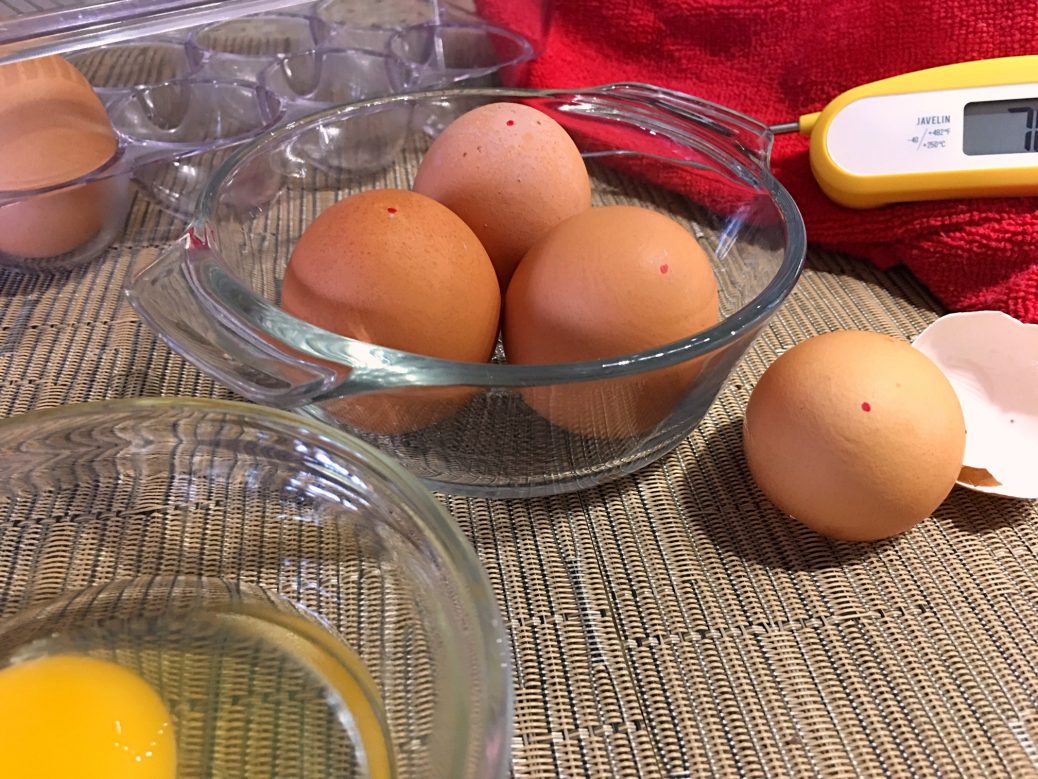Pasteurizing Eggs

When some people see “raw eggs” in recipes such as mayonnaise or in the making of Dijonnaise, Vietnamese Egg Coffee or Orange Julius, Caesar salad, steak tartare, Caribbean Rum Mousse, and so on, they walk away 🚶♀️🚶♂️ and I don’t blame them. There can be a small chance that raw eggs can carry the salmonella bacterium BUT there’s a process that can be done to kill this harmful bacteria which is Pasteurizing Eggs.
How does it work 🤔?
Technical but not complicated, Pasteurizing Eggs is a process where food is cooked briefly at the temperature of 140ºF. If it goes beyond that 141º, the egg yolk will start cooking. The short time the egg is cooked is enough to eliminate or slow the bacteria if the egg carries it. You’ll still end up with the consistency of raw eggs 🥚 and be able to proceed with your recipe.
Depending on where you live, you might be able to buy pasteurized eggs at some grocery stores although they are quite hard to find and the price is definitely much higher 💰 than other eggs. Also, when eggs are pasteurized, it’s wise to use them soon after therefore use the exact amount you need.
Keep in mind to try and buy 🛒 fresh eggs especially if you want to use some uncooked ones for recipes. “The Fresher, the Better!” The bacterium is mostly found on the eggshell although it can sometimes get inside the egg.
Here in North America 🌎 the chances of coming across salmonella in raw eggs is pretty slim but there’s nothing wrong with being extra cautious when handling uncooked eggs. Pasteurizing Eggs is a simple process that will ensure they are safe to use.
Bon Appétit!🍽
DISCLAIMER: I cannot guarantee that this process will completely eliminate the bacterium salmonella and if you’ve decided to proceed with this method, it’s at your own risk. To get more info about egg safety, click on the link below…
https://www.canada.ca/en/health-canada/services/meat-poultry-fish-seafood-safety/eggs.html
Check out these other helpful tips & tricks…😀
– Grind Chicken & Save Money
– Better Cheese Storage
– Berries • How to Keep Them Longer
– Pearl Onions • Easiest Way to Peel
– How to Revive Stale Bread
– Defrosting Meats Quickly
– How to Store Celery for Weeks
– Secret for Better Grating Soft Cheeses/Butter
– How to Remove Bitterness from Onions
and for more handy kitchen tips and tricks 💡, click on this link… Recipe Category • Tips & Tricks
Don’t forget to subscribe to our YouTube channel 📽 by clicking on this link… Club Foody YouTube

Pasteurizing Eggs
Hover to scale
Ingredients
- Free-run eggs, as needed
- Digital thermometer
Directions
- Remove the eggs from the refrigerator and allow them to sit on the counter for 30 minutes.
- In a medium saucepan, add eggs and cover with cold water to 2-inches above. Use a thermometer making sure it doesn’t touch the bottom of the pan for better accuracy.
- Turn the heat to medium and when the water reaches 130-131-132ºF, turn the heat down to low.
- When the water reaches 140ºF, cook eggs for 3 minutes or if they’re jumbo or extra-large, cook for 4 minutes. If the water’s temperature goes beyond, add a little bit of cold water.
- When the time is up, remove from the heat and transfer them to an ice bath; let them sit for 10 minutes.
- Carefully dry them off but before returning them to the refrigerator, mark them with a marker so you know which ones are processed. They will be good for up to 1 week.
Don't forget to rate and comment on this recipe!


